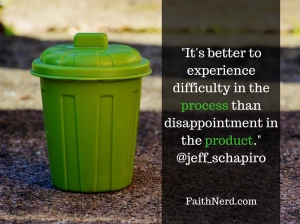
I teach my four-year-old son a lot of questionable things.
I’m not saying I teach him bad things per se, just that they could become bad things if he chooses to use them in the wrong context.
For example: If I’m eating ice cream out of a mug at home and he sees me, sometimes he’ll come up and say, “What are you eating, Dada?” I’ll respond by saying (jokingly), “Nunya…nunya business!”
He always gets a kick out of that, but it’s only a matter of time before I get a call from a certain preschool teacher who wants to know why my son disrespected her with that exact phrase.
So as I’ve been teaching him these things I’ve also been waiting for the moment he gets in trouble using them, but the other day something completely unexpected happened: He used one of my sayings in a way that made me proud of him.
Here’s how it went down (as was recently recounted by my son to my mom):
My son was in class at preschool playing with a little girl who is one of his best friends. Another boy from the class came over and started picking on the girl, and in response my son looked at the boy and said, “Make like a tree, and leaf my friend alone!”
Chip off the old block, eh?
One of the things I’ve always loved about my son is the way he sticks up for people who he feels have been wronged. In fact, I think most of us could learn a lesson from his boldness in the face of injustice.
Here’s a hard truth: Many of us (including myself) have mistaken apathy for kindness.
We’re called not to sit idly by as a parade of injustices marches by. We’re called to step up and speak up to defend those around us.
This idea is first and foremost exampled to us by Jesus, but it is also stated explicitly in passages like the following:
Speak up for those who cannot speak for themselves;
ensure justice for those being crushed.
Yes, speak up for the poor and helpless,
and see that they get justice. (Proverbs 31:8-9)
and
Learn to do good.
Seek justice.
Help the oppressed.
Defend the cause of orphans.
Fight for the rights of widows. (Isaiah 1:17)
So you see, you are your brother’s keeper. That’s not to say we should go berserk or seek revenge on those that wrong others — vengeance belongs to God. But we need to recognize that love requires us to step between a bully and his victim. After all, Jesus stepped between our greatest enemies (Satan, sin, and death) and us.
Let’s follow his example.


 A long time ago a father built a campfire with his son. The father had to go away for a few hours, and night was getting close, so he warned his son to be careful not to let the flame go out.
A long time ago a father built a campfire with his son. The father had to go away for a few hours, and night was getting close, so he warned his son to be careful not to let the flame go out.
 Listen to me: Even if you’re really skilled at what you do, don’t use your talent to justify turning off the road prematurely. It’s better to experience difficulty in the process than disappointment in the product.
Listen to me: Even if you’re really skilled at what you do, don’t use your talent to justify turning off the road prematurely. It’s better to experience difficulty in the process than disappointment in the product.